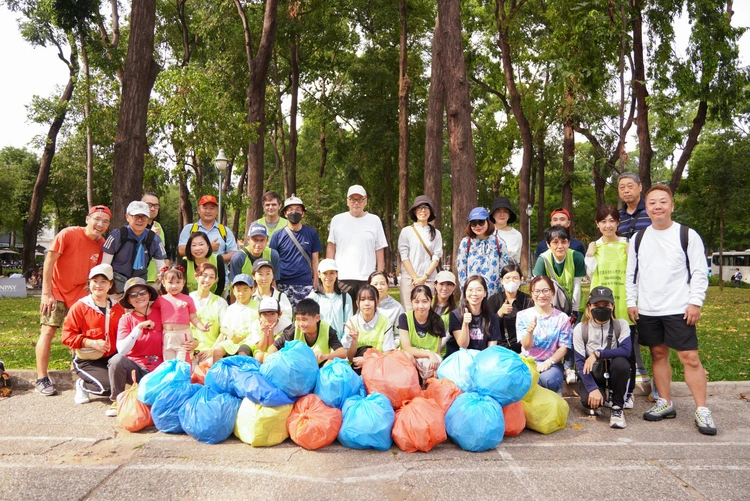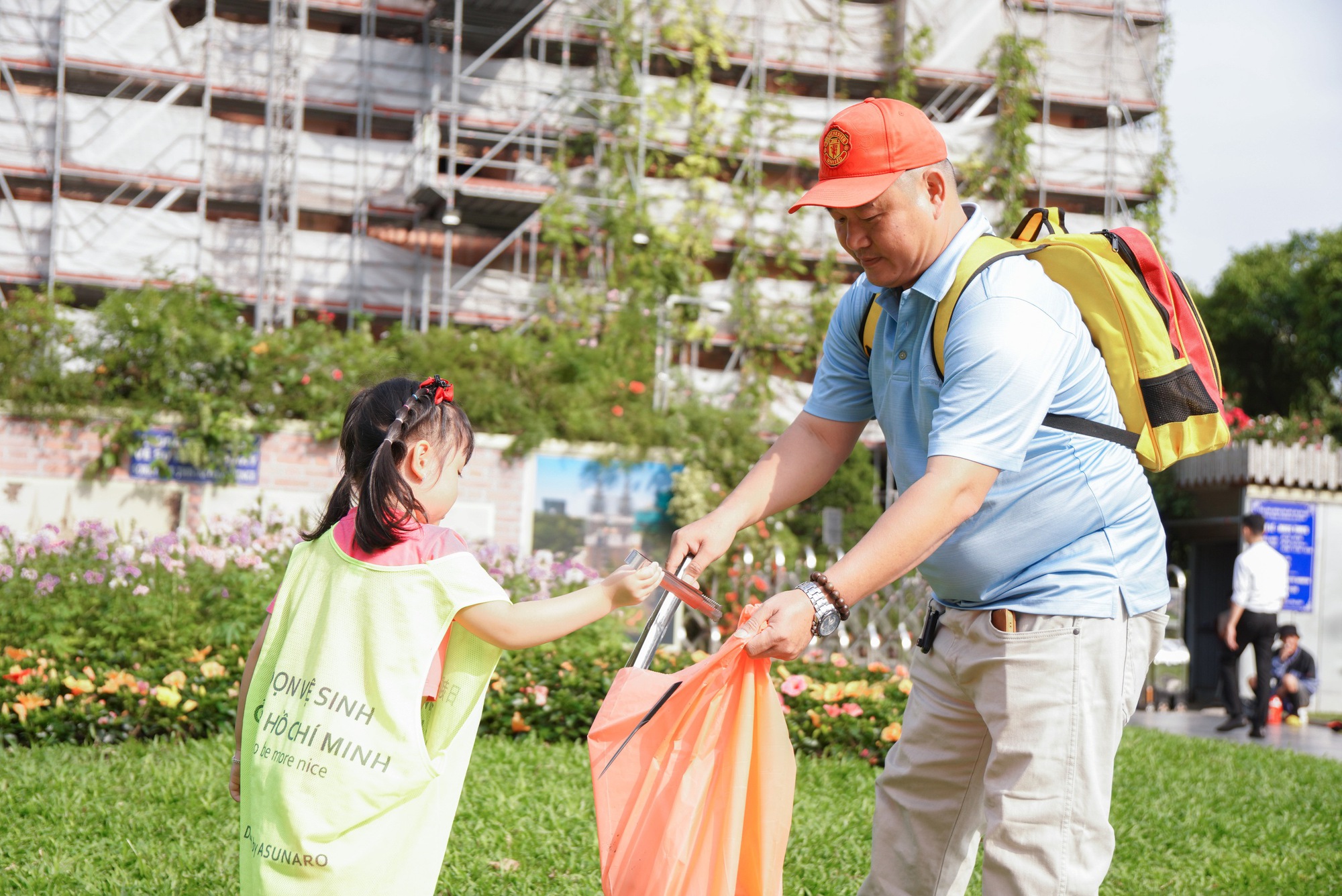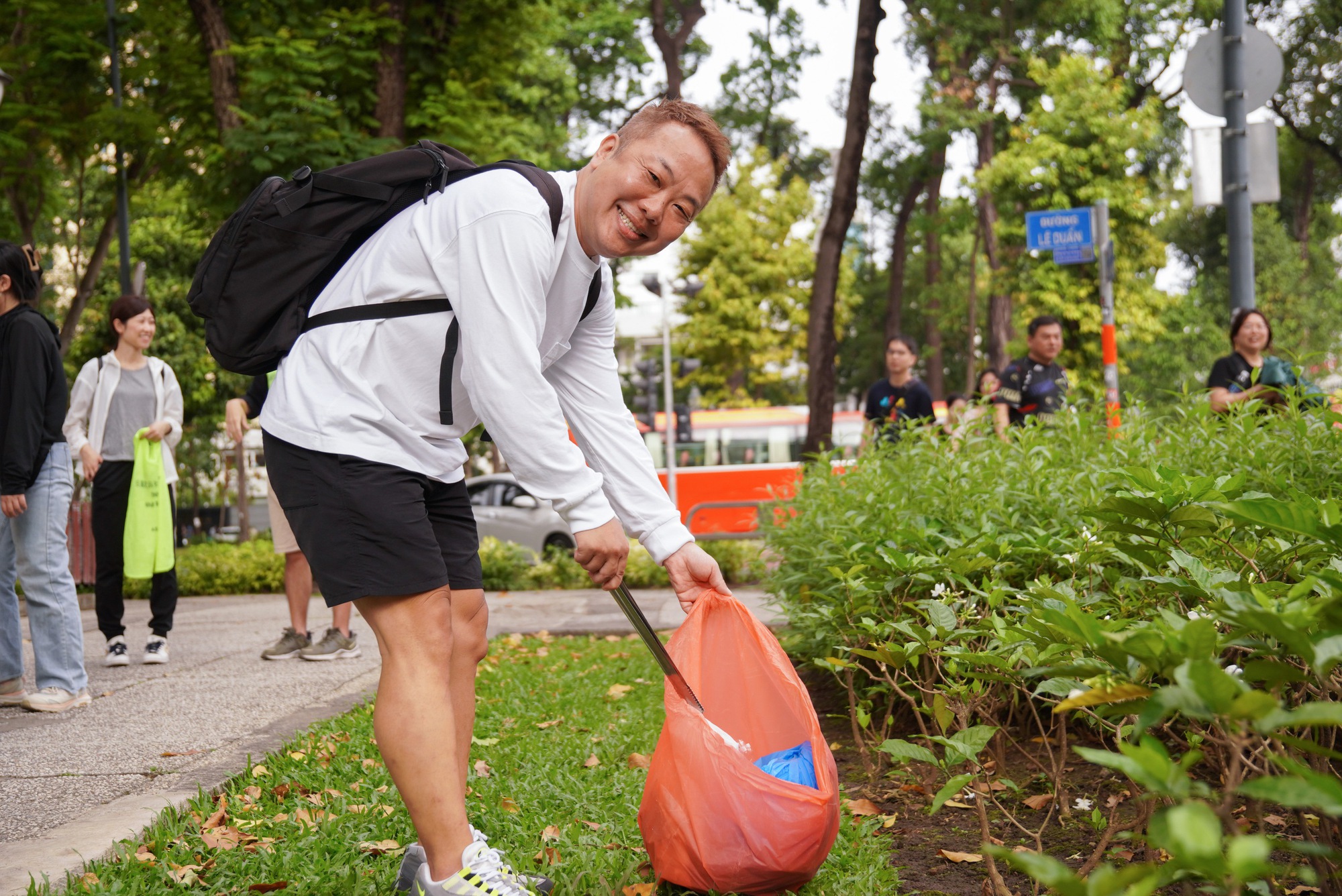
Japanese and Vietnamese volunteers pose for a photo after their weekly cleanup in downtown Ho Chi Minh City, April 6, 2025. Photo: An Vi
Armed with trash bags and litter grabbers, the group works for about 90 minutes cleaning areas around the post office, Notre-Dame Cathedral Basilica of Saigon, and 30-4 Park in District 1.
90-minute cleanup
Kenta Fuji, 46, who works in Ho Chi Minh City, is there to organize the group.
He founded the ‘TINH NGUYEN Nhat Ban & Viet Nam’ (Japan & Vietnam Volunteer) group on Facebook, which now has nearly 3,500 members.
The group uses the platform to share details about the weekly cleanup sessions.
With just a brief notice and no need for formal confirmation, a large number of volunteers show up promptly at 8:00 am every Sunday.
Some come from as far as Binh Duong Province, just outside Ho Chi Minh City, traveling early in the morning to join the effort.
Applause greets the group as they gather, followed by cheers for newcomers joining for the first time.
Then, they get to work.
As usual, the group focused on cleaning up the areas around the Saigon Central Post Office, Notre-Dame Cathedral Basilica of Saigon, and 30-4 Park last Sunday.
Under the soft morning sun, volunteers in simple uniforms diligently cleaned around trees, grass, and benches.
Middle-aged Japanese men, quietly focused, used long grabbers to pick up cigarette butts beneath trees, while young Vietnamese volunteers swiftly collected trash into bags, occasionally practicing their Japanese with the older volunteers.
Among the group, a few children were also present, brought along by their parents to spend time together and learn about environmental awareness.
One of them, four-year-old Vo Khanh Quynh, accompanied her father Vo Tan Hung, 47, from Binh Duong to District 1 to pick up litter.

Vo Tan Hung and his daughter, Vo Khanh Quynh, collect trash in downtown Ho Chi Minh City, April 6, 2025. Photo: An Vi
Wearing a baggy uniform that almost reached her feet, she eagerly wandered around the park with a litter picker, amusing tourists who smiled at her efforts.
Foreign visitors, impressed by the father-daughter duo, began to collect litter and drop it into the trash bags, patting Quynh on the head and offering a gentle 'thank you.'
Locals sipping coffee at nearby cafés also showed their appreciation with 'arigato' when the Japanese volunteers passed by.
The group’s actions had an immediate effect as well.
Some parkgoers who had left plastic cups behind returned to pick them up when they saw the volunteers at work.
By 9:30 am, despite the heat and sweat, smiles were still visible as the group gathered dozens of trash bags.
Fuji said the cleanups usually last around 90 minutes, though on weeks with less trash, they wrap up in about an hour.
“Then we all sit down for coffee, chat, and make plans for next week’s cleanup,” Fuji said with a smile.
A decade of service
Each week, 20-40 volunteers participate in the cleanups, with Fuji noting that the number of participants already reached 5,000.
Reflecting on the beginnings of the initiative, Fuji recalled that 10 years ago, he was joined by just three friends.
“I posted a message on Facebook calling for people to join me in cleaning up,” Fuji said.
“At first, a few friends responded, then the group grew.”
Tuoi Tre (Youth) newspaper spoke with him through an interpreter, but his sincerity came through in his tone and expression as he shared his 10-year volunteer journey.
“I came to Vietnam 10 years ago, and I started cleaning up right away,” Fuji explained.
“It’s become a habit for us.
“More importantly, it’s one of the ways I want to give back to the country that has welcomed me.”
He added that he has no reservations about picking up litter and sees it as a fun weekend activity with friends.
He enjoys the most when Vietnamese people, especially those who speak Japanese, thank him in his mother tongue.

Kenta Fuji, founder of the ‘TINH NGUYEN Nhat Ban & Viet Nam’ (Japan & Vietnam Volunteer) group on Facebook, collects trash during their weekly cleanup in downtown Ho Chi Minh City, April 6, 2025. Photo: An Vi
However, Fuji sometimes feels disheartened when he sees the parks his team cleaned just days before already littered again.
“I’m not angry -- just a bit disappointed by how quickly the trash comes back,” he said.
“But I’ve come to accept it. A completely trash-free environment may be unrealistic.
“I just hope what we’re doing helps raise awareness.”
Vietnam-Japan cultural exchange
Among the nearly 40 people cleaning up last Sunday, many do not live or work in Ho Chi Minh City but still participated in the drive.
Vo Tan Hung, who works at a Japanese mechanical maintenance company, explained that he also studies Japanese to enhance his career, and these community activities are a great opportunity to practice the language.
Despite being a beginner, Hung was relieved when many of the Japanese volunteers understood and responded in simple Japanese.
These exchanges have helped him improve his language skills.
“I also genuinely want to help protect the environment,” Hung said.
“Sometimes, I feel embarrassed by the litter on our streets but it’s inconvenient to stop and pick it up.
“This activity gives me a chance to contribute.”
Hung admires the Japanese community’s strong environmental consciousness.
“I respect and learn from their values,” he added with a smile.
“I always remind my daughter to throw trash in the right place, and she’s excited to join me today.”
Khanh Vu, 43, a Japanese teacher in Binh Duong, also brought her students to Ho Chi Minh City to join hands and improve their language skills.
She has been joining Fuji’s cleanups for eight years, incorporating them into her lessons as practice with native speakers.
“At first, my students were shy, but thanks to the friendly Japanese volunteers who patiently corrected their pronunciation, they’ve made great progress,” Vu said.
Vu and Hung serve as bridges in post-cleanup coffee sessions.
Language barriers are minimal during these activities, as many Japanese volunteers who have lived in Vietnam for a long time are able to respond in Vietnamese when necessary.
Some young Japanese participants also use the cleanups to practice their Vietnamese.
Fuji is pleased to see the progress after 10 years, noting that the amount of litter in the areas he and his group clean has decreased.
He also pointed to growing local participation as a sign of success.


Max: 1500 characters
There are no comments yet. Be the first to comment.